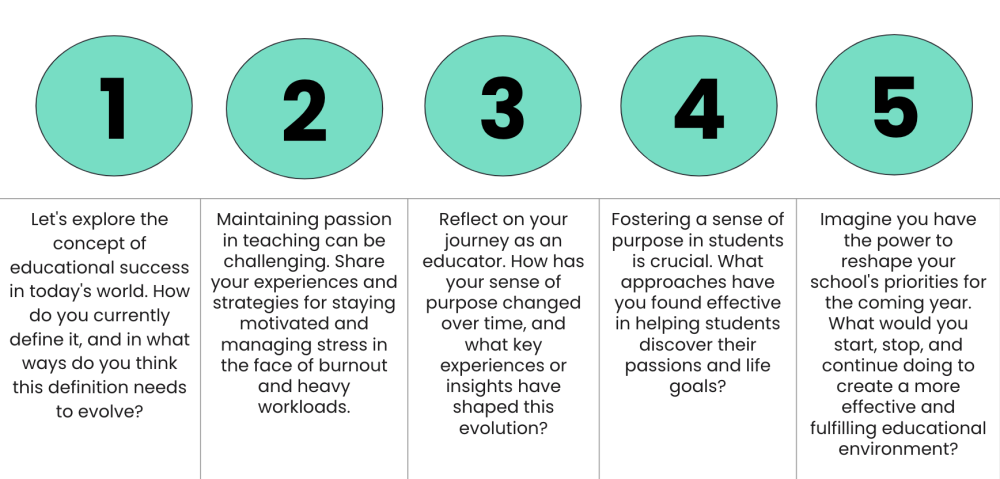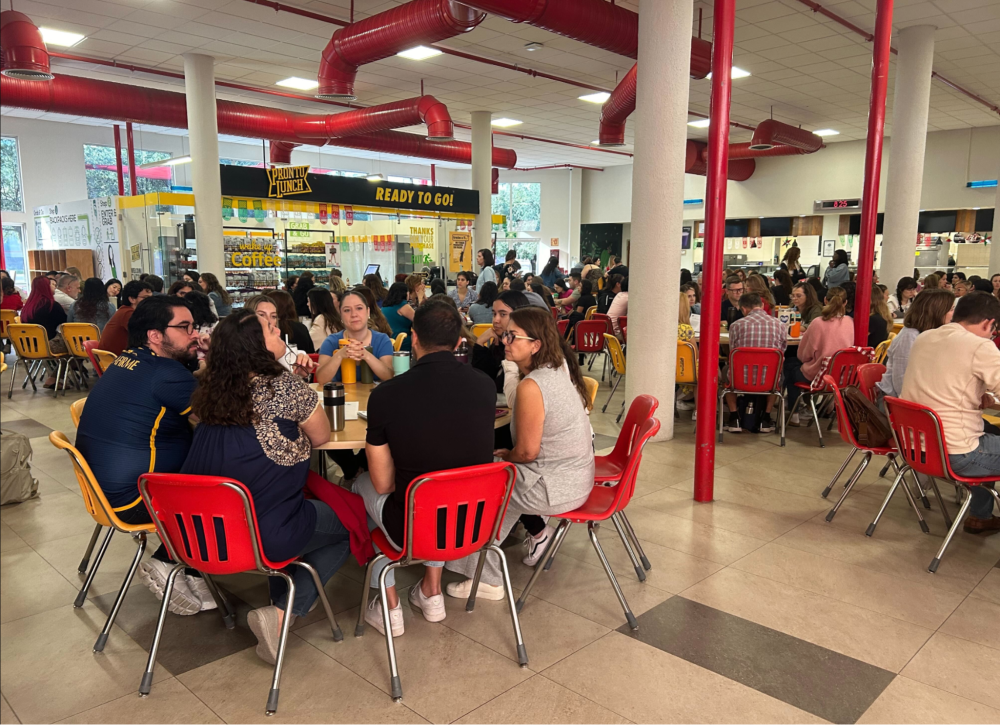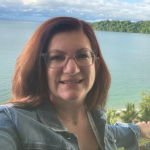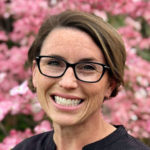Creating Spaces for Dialogue That Matters: World Cafe
GOA is working on discussing big ideas better. Currently, a few of us are reading Charles Duhigg’s Supercommunicators. Our staff engages in a monthly Ideas Salon, exploring playlists on topics that support team culture. Our student program, in collaboration with faculty member Dr. Jacqueline Grant, launched a new course: Discourse across Difference. Whether small gatherings or large group experiences, we care deeply about productive discourse at GOA and are especially interested in how we might design for it more intentionally: What are the frameworks that invite diverse perspectives, that create access points for every participant, and that make it safe to show up in conversations?
One of the frameworks that’s served us is the World Cafe method. There is never a wrong time to plan for meaningful discussions in our schools, and a World Cafe can be a powerful experience for understanding important ideas together, nurturing connections, and articulating next steps.
Consider these two World Cafe experiences:
World Cafe for Framing Purpose
In the last few years, we’ve engaged participants at GOA’s annual Learning Summit in a World Cafe to invite ideas across differences and to jumpstart conversations that can continue throughout the Summit days. Last year, the theme “Enduring Purpose” framed our programming, and in advance of the Summit we prepared by identifying meaty questions--questions, we hoped every participant could see themselves in:

At the Summit’s World Cafe, as we were a group of nearly 100, we wrote each question on two pieces of chart paper and spread the ten questions around the room with markers at each station. After a few minutes of whole group instructions, participants moved to a question that resonated with them. They spent 15 minutes discussing one question in their self-organized groups--groups representing different schools, grade levels, places, and roles--and then captured themes from the conversation on the chart paper.
Three 15 minute rounds followed, with participants choosing to shift to new questions or stay at their current station. Across the hour, the papers filled with reflections, connections to previous groups’ ideas, and ongoing takeaways. Participants could talk or write. They could listen or share. Conversations could build on new ideas or respond to what was already on the paper.
And then, at the end of the series of rounds, we engaged in the most important phase of the World Cafe--the Harvest. During this whole group time, we took a final 15 minutes for one brave volunteer (sometimes “volun-told”) from each group to share a headline or important theme that emerged from the collective notes on the chart paper. This part of the process is essential; the harvest is not one person’s ideas; it is a reflection of what emerged from multiple contributions on the chart paper and in dialogue. Ten different takeaways, representing 100 different voices, were heard. And in the entirety of the experience, each participant, at their own comfort level, had a chance to dig into the concepts that would frame the coming day of the Learning Summit, to meet one another through important work, and to consider topics that they wanted to talk about more. The World Cafe was both fodder for dinner time convos and a safe space for exploring deeply important reflections that might frame individuals’ Summit projects.
Download this slidedeck PDF to view the framework and photos from the experience.
World Cafe for Future-Focused Collaboration
A benefit of the World Cafe Method is its adaptability. As all of our schools will be at some point, the American School Foundation of Monterrey (ASFM) is in the midst of an accreditation process. The work that goes into becoming accredited deeply matters because it ensures our educational practices meet high standards and continuously improve, ultimately benefiting our students’ learning experiences and outcomes. Engaging ways to develop shared understanding and inspiration are essential to this success. Recently, ASFM engaged in a modified World Cafe to introduce faculty to New England Association of Schools and Colleges’ (NEASC) ACE Learning Principles (LPs), to get to know them in the context of their roles, and then to make a choice on which principles they wanted to support in the accreditation process. The intended outcome of the cafe was for participants to be informed enough to self-select into principle-based committees.
Joelle Hernandez, GOA faculty and ASFM Accreditation Coordinator, followed a similar method to the Learning Summit, with all ten LPs documented on ten chart papers and accompanied by accreditation resources explaining each principle. Knowing that none of the principles were optional for the school to organize into committees, she innovated the World Cafe protocol and first assigned people into groups and to chart papers to ensure every principle was discussed. Her school already had cross-team and grade level groups formed from a staff social event (a schoolwide “Amazing Race”), and so she returned folks to those familiar groups to start the process. For the first two rounds, she refocused groups on different LPs to increase their exposure and generate more comprehensive feedback, and then for the last two rounds, faculty had the freedom to choose the LPs that most resonated with them.

The result was a Harvest that informed everyone on important insights for every principle, each person gaining deeper understanding of at least four principles, and enough collective experience and conversation to then self-select into committees to continue the accreditation work. What could have felt like confusion around future tasks-to-be-done instead became an enjoyable event of connection, conversation, and clarification.
What’s Next?
The World Cafe model has the potential to bring together students, families, and school stakeholders in shared, structured engagement that prioritizes both connection and practical progress. It can be a human-centered approach for discourse across differences. As your teams navigate change, explore complex ideas, and root themselves in important values, how might a World Cafe model promote understanding and next steps?
For more resources supporting school teams, explore GOA’s PLaybook--a monthly member resource for instructional leaders offering curated playlists, design sprints, and tools to bolster your strategies and support meaningful change at your school. Learn more here. Additionally, member school students can enroll in Discourse Across Difference.
Joelle Hernandez is the Accreditation Coordinator at American School Foundation of Monterrey in Monterrey, Mexico and a Branding and Marketing and Micro Economics teacher at GOA. You can find Joelle on LinkedIn and GreatHeights.
GOA is a nonprofit learning organization that reimagines learning to empower students and educators worldwide. In partnership with our global network of 150 schools, we provide interactive, relationship-driven courses, expert resources, and innovative thinking that help to expand and elevate academic programs. Together, we help students and educators become open to the extraordinary.
Follow us on LinkedIn for the latest learning opportunities and news. Sign up for GOA Insights, our newsletter focused on innovative ideas and best practices for the future of learning. Become a Member School.

